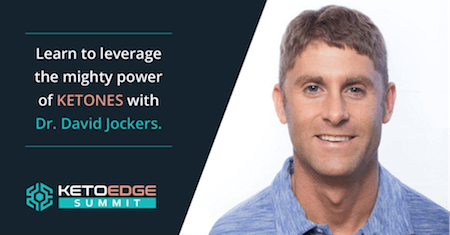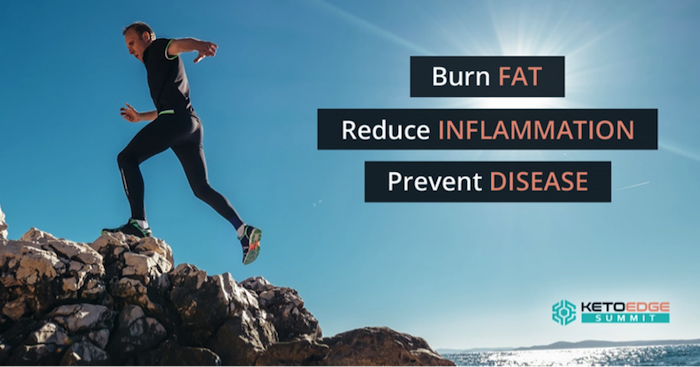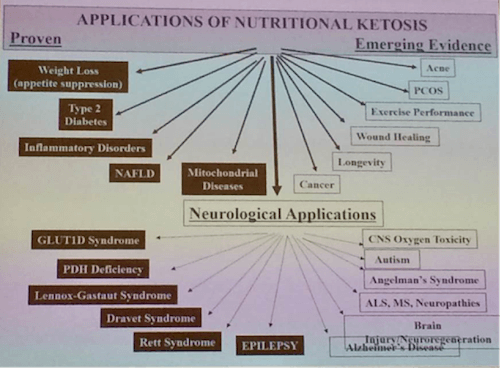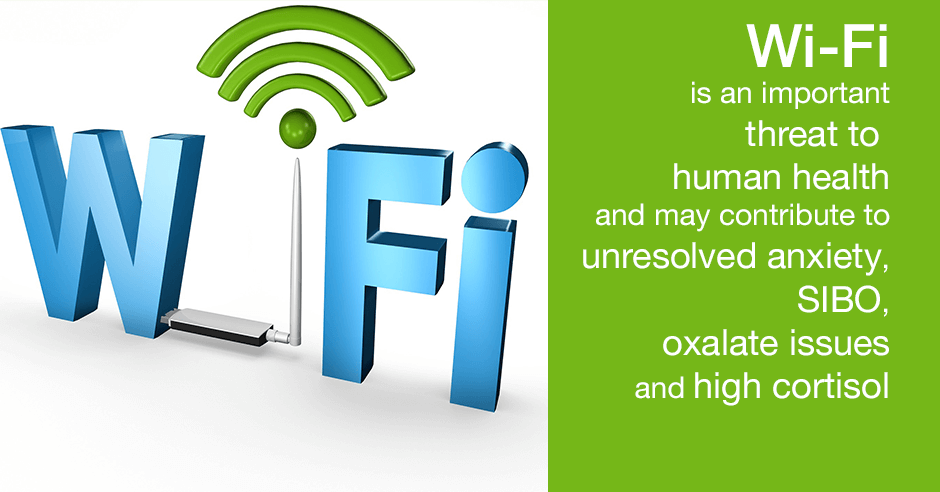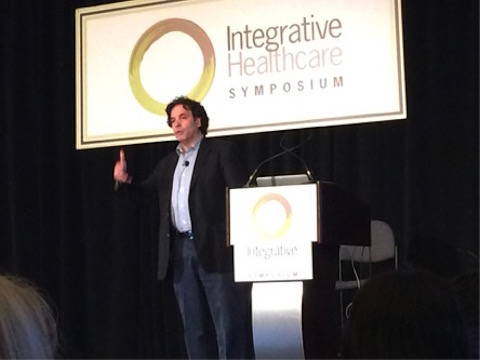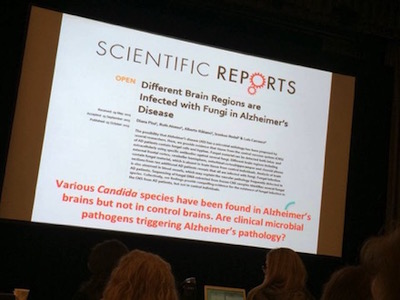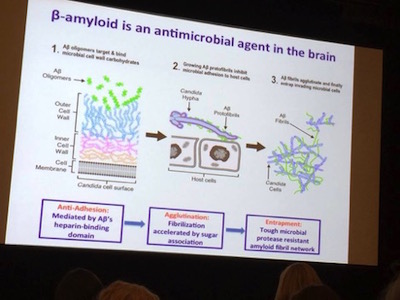There is a wonderful new recipe book out this week and I want you to know about it!
Dealing with an autoimmune or other chronic health condition such as Hashimoto’s, IBS, Celiac, RA, Psoriasis, chronic fatigue or fibromyalgia, or even just committing to your family’s health does NOT have to mean giving up delicious foods!
No one knows this better than my dear friend and world-renowned functional medicine physician, Amy Myers, MD.
Amy Myers reversed her own autoimmune condition by addressing the root causes of her illness and diet played a HUGE role. She continues to follow the same dietary program that she recommends to her patients and community.
We actually ate out together in Melbourne at the recent Bioceuticals Symposium and I saw her put The Myers Way® (her proven program) of eating into practice at the restaurant, making sure everything she was eating was safe and would not trigger an autoimmune flare. Our server worked hard making sure all her questions were addressed in a satisfactory manner and she set a great example for all of us.
She does this in her wonderful new cookbook, setting a great example and guiding you to make the right choices in order to reduce inflammation, heal your leaky gut and help you move toward the optimal health side of the autoimmune spectrum and stay there.

Amy inspires you to cook delicious meals at the same time. She helps you change the way you look at food, both when you’re cooking at home for our families, and when we’re eating out and traveling.
This new book, The Autoimmune Solution Cookbook (my Amazon link), contains over 150 absolutely delicious, easy-to-make, autoimmune-reversing recipes. Amy shares this:
Whether you’re a five-star chef or just getting started in the kitchen, I created these recipes to be a piece of cake (YES! There’s even a birthday cake recipe I created for my daughter).
This cookbook is perfect for you if you:
- Have an autoimmune or other chronic condition
- Know that autoimmunity runs in your family
- Currently follow an autoimmune, Paleo or ketogenic diet
- Have read The Autoimmune Solution and have already followed its thirty-day protocol, this cookbook is the perfect companion for spicing up your diet and adding more variety to your mealtimes
- Are dealing with leaky gut, seasonal allergies, asthma, or eczema
- Have Hashimoto’s, Graves’, or any other type of thyroid issue
- Deal with digestive issues such as bloating, gas, constipation, and more
- Have food allergies or food sensitivities
- Have a loved one dealing with any of the above issues and are looking for the perfect gift for them
- Are looking for a gift for your doctor or other health practitioner
Here are 2 yummy recipes to get you tempted, your mouth watering and cooking: Refreshing Mango-Avocado Salsa and Coconut Shrimp.
Refreshing Mango-Avocado Salsa
With summer approaching, this refreshing mango-avocado salsa makes the perfect poolside snack or cookout appetizer served with plantain chips. Or add it to grilled fish, shrimp, or chicken for an extra boost of inflammation-fighting Omega 3 fatty acids. Makes 2 cups
Ingredients:
1 mango, cubed
1 avocado, cubed
½ red onion, finely chopped
3 tablespoons chopped fresh cilantro
Juice of 1 small lime
1 tablespoon extra virgin olive oil
¼ teaspoon fine sea salt
½ teaspoon freshly ground black pepper
½ teaspoon ground cumin
Instructions:
In a bowl, combine all ingredients and mix gently. Serve immediately
Coconut Shrimp
When I was growing up in New Orleans, my grandparents took the family out to dinner at the Yacht Club for special occasions, and I always ordered a fried shrimp po’ boy—a traditional Louisiana sandwich. This substitute for fried shrimp is a healthier option that everyone will love. The shrimp are tossed with coconut flour and shredded coconut instead of breadcrumbs— and they are so easy to make! My husband and I served this as an appetizer at our wedding and they were a huge hit! Serves 4
Ingredients:
2 tablespoons coconut flour
½ cup unsweetened shredded coconut
1 teaspoon garlic powder
1 teaspoon onion powder
½ teaspoon fine sea salt
½ teaspoon ground black pepper
¾ cup full-fat coconut milk
1 ½ tablespoons coconut aminos
1 pound wild-caught shrimp
Instructions:
- Heat oven to 400°F. In a shallow bowl, whisk together coconut flour, shredded coconut, garlic and onion powders, salt, and pepper.
- In another shallow bowl, whisk together the coconut milk and coconut aminos.
- Dip each shrimp into the liquid mixture, and then into the dry mixture to coat. Arrange in a single layer in a baking dish. Bake for 15 to 20 minutes, until golden brown. For extra crispiness, remove the pan and set the oven to broil. Broil the shrimp for 4 to 5 minutes.
Some of the other recipes I’m really looking forward to trying are the creamy zucchini-basil soup, the herbed roast chicken, the world’s best Asian flank steak, the rosemary sea-salt crackers (made with cassava flour), the spinach artichoke dip (I’ll replace the spinach with low-oxalate dino kale), raspberry cheesecake bites (I’ll make it with blueberries instead of high-oxalate raspberries), and the apple crisp. There are so many delicious recipes!
There is no perfect eating plan for everyone and Amy has created this eating plan and recipes to cater for the majority of those with an autoimmune condition. I really appreciate that recipes are marked as being autoimmune-friendly, thyroid-friendly, suitable for candida and SIBO, and low histamine. However, if you do have oxalate issues you will need to adjust some of the recipes. Also, if you have issues with collagen making your anxiety or insomnia worse then I recommend adding some protein powder to the recipes that call for gelatin or collagen, and/or consider a trial of tryptophan.
Here’s the official book blurb:
The companion cookbook to the revolutionary New York Times bestseller The Autoimmune Solution, filled with more than 150 nutritious, easy-to-prepare, every day recipes to heal symptoms of inflammation and autoimmune disorders, including Graves’ Disease, Psoriasis, Fibromyalgia, Lupus, Celiac disease, Hashimoto’s thyroiditis, and Multiple sclerosis.
Nine in ten Americans suffer from inflammation or an autoimmune disorder—conditions for which conventional medicine has no cure. Minor irritations like rashes and runny noses are ignored, while chronic and debilitating diseases like Crohn’s and rheumatoid arthritis are handled with a cocktail of toxic treatments that fail to address their root cause. But as Dr. Amy Myers revealed in The Autoimmune Solution, there are solutions. In this invaluable cookbook, she now shows you how to repair your body and reverse your symptoms by eating your way to good health.
The Autoimmune Solution Cookbook delivers more than 150 grain-free recipes designed to prevent and reverse the full spectrum of autoimmune diseases, including allergies, obesity, asthma, cardiovascular disease, fibromyalgia, lupus, IBS, chronic headaches, fatigue, multiple sclerosis, colitis, Graves’ disease, and Hashimoto’s thyroiditis. As our food and environment becomes more toxic, the health of millions of us have been impaired. Thanks to Dr. Myers, you no longer need to rely on prescriptions—with troubling, sometimes dangerous side effects—to counteract your body’s over-reactive immune system. The Autoimmune Solution Cookbook is the healthy alternative to cope with and conquer inflammatory-related symptoms and diseases.
If you’re ready to enjoy amazing meals that will help you take back your health and your life, this book is an absolute must-have, so get your copy of The Autoimmune Solution Cookbook today – on Amazon here (my affiliate link) or from your favorite book store.
This cookbook is the perfect companion to The Autoimmune Solution (my affiliate link), a wonderful book that introduced The Myers Way®, empowering so many to reverse their autoimmune conditions.
Learn more about the book and claim the book launch gifts here.
And stay tuned for an email notification from Dr. Myers about the upcoming Autoimmune Program webinar being held online on May 17. She’ll be sharing more about her group program if you’re the kind of person looking for a community-based program.
Happy cooking and do let us know how you enjoy the recipes!
If you have questions or feedback please post them in the comments below.



